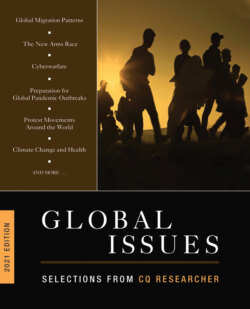Читать книгу Global Issues 2021 Edition - Группа авторов - Страница 76
Background Nuclear Age Dawns
ОглавлениеThe nuclear age dawned with a blinding flash on Aug. 6, 1945, when an American B-29 Superfortress dropped an atomic bomb on the Japanese port city of Hiroshima.
The explosion leveled the entire city, instantly killing 80,000 people. Three days later, the United States dropped a second nuclear bomb on Nagasaki, another port city, killing another 40,000 people. Tens of thousands of wounded would die later from severe burns and radiation poisoning. On Aug. 15, Japanese Emperor Hirohito, citing the immense power of “a new and most cruel bomb,” surrendered unconditionally, ending World War II.32
The atomic bomb dropped by the United States on Hiroshima in 1945 leveled the Japanese port city. Today’s hydrogen weapons are about 1,000 times more powerful than the atomic bomb.
Galerie Bilderwelt/Getty Images
After years of bloody fighting in Europe and the Pacific, the war’s end unleashed scenes of jubilation across the United States. But the bomb’s enormous destructive power also forced a moral reckoning among some of the physicists who created it. One of them, J. Robert Oppenheimer, said that as he watched the fiery mushroom cloud rise over the New Mexico desert during the bomb’s first test, he remembered a sentence from the Hindu scripture, the Bhagavad-Gita: “I am become death, the destroyer of worlds.”33
Such moral qualms drove the earliest debates in Washington over controlling the spread of nuclear weapons know-how. One group in the Truman administration worried that America’s monopoly over nuclear weapons would spark a dangerous arms race with the Soviet Union, which was competing with the United States in a budding Cold War for global influence. This group proposed sharing the nation’s nuclear secrets with Moscow to establish a parity that would stabilize relations. Another group opposed giving up America’s strategic advantage over the Soviets.34
In 1946, the United States proposed that the newly formed United Nations establish an international agency to control the proliferation of nuclear weapons, but preserve Washington’s status as the world’s only nuclear power. The Soviets, already on their way to developing their own atomic bomb, rejected the proposal, and the United States spurned a Soviet counterproposal to ban all nuclear weapons.35
